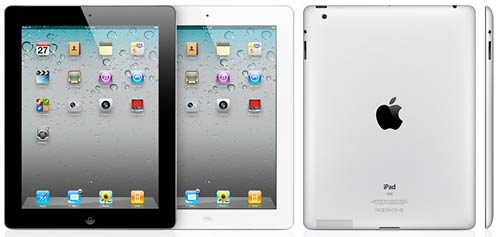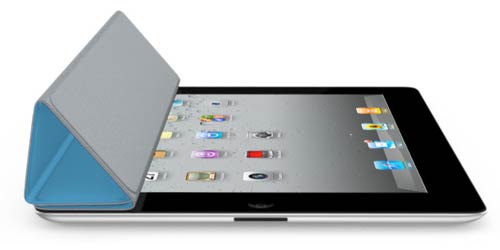« The best of times, the worst of times | Main | Should I upgrade my iPhone and iPad? »
March 03, 2011
Apple's iPad 2 -- Upping the ante
Steve Jobs announced the iPad 2 on March 2. No one expected Jobs to do it himself as he's been on a medical leave of absence for a while now. He looked none the worse for wear, though I can't imagine that things are very good for him.
The iPad 2, of course, was expected, though it's hard to argue that it was already necessary. Apple sold about 15 million iPads in 2010 (in nine months, really, as the iPad didn't start selling until April), and demand keeps growing. Apple also wasn't pressured by the competition, which largely remains on the drawing board or early stages of deployment.
Anyway, the new iPad looks almost exactly the same as the original, but it is considerably thinner (0.35 vs 0.5 inches) and weighs less (1.3 lbs. vs 1.5 lbs.). Though I never felt that way, there's been criticism about the iPad's weight, and so the small but noticeable reduction addresses those concerns.
 The iPad2 will be powered by a 1GHz dual core Apple A5 processor that, according to Jobs, is twice as fast and offers 9x graphics performance. No one is entirely sure about the specifics of Apple's processors (the Apple A4 chip that powered the original iPad is based on the ubiquitous ARM Cortex-A8 core, special PowerVR-technology graphics, plus Apple's special sauce, and it's manufactured by Samsung). The new A5 chip has dual cores, is still running at the same 1GHz clock speed, and presumably has much more powerful graphics processors. I never felt the original iPad was lacking in speed (whatever hangups there were always seemed AT&T related), but experience with the iPhone has shown that news apps designed for newer technology will quickly make older hardware feel slow.
The iPad2 will be powered by a 1GHz dual core Apple A5 processor that, according to Jobs, is twice as fast and offers 9x graphics performance. No one is entirely sure about the specifics of Apple's processors (the Apple A4 chip that powered the original iPad is based on the ubiquitous ARM Cortex-A8 core, special PowerVR-technology graphics, plus Apple's special sauce, and it's manufactured by Samsung). The new A5 chip has dual cores, is still running at the same 1GHz clock speed, and presumably has much more powerful graphics processors. I never felt the original iPad was lacking in speed (whatever hangups there were always seemed AT&T related), but experience with the iPhone has shown that news apps designed for newer technology will quickly make older hardware feel slow.
One area where the iPad has been taking heavy criticism is its lack of a camera. Virtually all smartphones have cameras now (heck, it's gotten to a point where world history is being captured on smartphones), and many of the emerging iPad competitors have a camera or even two (one to take pictures, the other for video conferencing).
Well, there are now two cameras. Apple didn't specify megapixel, but stated that the one in front records video and stills at VGA resolution, and the one in the rear at up to 720p. VGA, of course, is 640 x 480 pixel, or 0.3 megapixel. 720p is what one might call "HD light." It's the definition used by some of the less expensive, smaller screen HDTVs and nominally refers to 1280 x 720 pixel resolution (though it's also used for the 1366 x 768 res often seen in such TVs). So that's around one megapixel. The competition will almost certainly diss Apple for the relatively low resolution of the iPad 2 cameras (there are tablets with 3 and 5-megapixel cameras), but Apple's decision makes total sense to me: for video conferencing there's simply no need to capture and process more pixels than you need. And for shooting 720p video, it's not necessary either. Apple correctly decided to go for best speed and usability as opposed to shoehorning a full digital camera into the iPad 2.
Expect the iPad 2 to be much more aware of its position and movement. That's because it includes a gyroscope. Gyroscopes are much better and more comprehensive at sensing movement than simple accelerometers. That means we'll soon see a new generation of 3D games and other software that'll take advantage of it.
More speed and power often comes at the cost of either a bigger, heavier battery or, if that is not possible, less battery life. Apple claims the same battery life for the iPad 2 (around ten hours) as for the original. And that even though the new device is both thinner and lighter, and even though the capacity of the 3.8V battery remains at 25 watt-hours. Well, no one believed it when Apple claimed ten hours of battery life for the original, and yet it was true. So I believe Apple's projections.
The new iPad still has neither a card slot nor a standard USB port. Apple (or Jobs, really) has always been very dogmatic about ports and interfacing, and for the most part, that has never bothered me. I do appreciate that they finally added an SD Card slot in recent iMacs, but I never much missed a slot in the iPad (I do have all the appropriate adapters, though). One new thing is that the iPad 2 supports HDMI-out via cable, which means you'll be able to see what's on the iPad screen on a HDTV, and unlike the original VGA adapter, this one is said to work with all apps.
While the original iPad came in different memory configuration and either with or without 3G, the iPad 2 offers many more permutations by adding your choice of colors (black or white) and network technology (AT&T or Verizon) to the mix. Color really doesn't matter to me (my iPad spent most of its life in Apple's terrific "elephant leather" case anyway), but the choice of networks opens things up considerably. Apple did not say what data plans would be available and how much they'd cost, probably because they know as well as anyone that having to deal with telcos is the low and sore point of the tablet experience.
On the software side, Apple announced and demoed iMovie and GarageBand for the iPad. I am not a musician and so have no appreciation for the apparently amazing capabilities of Garage Band, but iMove certainly looks interesting. And for US$4.99 each, a total steal, millions will get both apps.
Of note: the display apparently did not change. It's a different model from LG Phillips, but still measures 9.7 inches diagonally and has 1024 x 768 pixels. So no new "retina" style display with stupendously high resolution. That'll likely come in the next iteration of the iPad. No big deal. I never felt the original iPad's display resolution was lacking. A much more pressing problem, though, remains unaddressed: gloss and reflection. Though the original iPad was relatively immune to fingerprint smudges, enough of the unsightly grease went through to be an embarrassing nuisance. The iPad 2 specs state "fingerprint-resistant oleophobic coating," but whether it's an improvement over the original or not is unclear; Jobs didn't address that. The gloss and reflection, likewise, probably remain. That is a bit of a downer as no one I know enjoys a glossy, reflective screen (one of tech's most dubious developments over the past few years).
Pricing remains exactly the same as for the original iPad: US$499 (16GB), US$599 (32GB), US$699 (64GB) for the WiFi-ony versions, and US$130 more for 3G versions. That's probably as expected, and it is certain to give iPad competitors even more intestinal gas than they already have: while for years it was easy to dismiss Apple products based on their price premium, that's simply not the case with the iPad. In fact, as if coming close to offering a competitive tablet product weren't difficult enough, meeting or beating Apples pricing and still make a profit seems near impossible.
 One thing I'll be certain to miss on the iPad 2 (yes, I'll get one as soon as I can) is the old black "elephant skin" case. Jobs made the very reasonable point that they didn't design this beautifully slender new tablet just to then hide it in a thick cover, and introduced what Apple calls the "Smart Cover" for the new iPad. Unlike the old cases, the Smart Cover uses a hinge and only covers the front of the iPad 2. It's cleverly designed to be used as a stand. And it has magnets that automatically turn the iPad 2 on and off. The new covers (which are sold separately) come in either polyurethane in five bright colors ("Hey bad guys! I carry a super-cool $800 gadget!") or leather in five somewhat more subdued colors. Me, I'll probably opt for something that covers and protects my iPad 2 both front and back.
One thing I'll be certain to miss on the iPad 2 (yes, I'll get one as soon as I can) is the old black "elephant skin" case. Jobs made the very reasonable point that they didn't design this beautifully slender new tablet just to then hide it in a thick cover, and introduced what Apple calls the "Smart Cover" for the new iPad. Unlike the old cases, the Smart Cover uses a hinge and only covers the front of the iPad 2. It's cleverly designed to be used as a stand. And it has magnets that automatically turn the iPad 2 on and off. The new covers (which are sold separately) come in either polyurethane in five bright colors ("Hey bad guys! I carry a super-cool $800 gadget!") or leather in five somewhat more subdued colors. Me, I'll probably opt for something that covers and protects my iPad 2 both front and back.
The new iPad 2 will be available March 11, 2011, in the US, and March 25 in much of the rest of the world. I'd have ordered mine instantly, but apparently you can't even place a order before March 11 though Apple surely could have bagged a huge number of pre-orders. Such is Apple's clout and confidence in the iPad 2. And things just got that much harder for anyone else. I mean, how can you compete with the iPad 2's hardware and price? All that appears left is a better spec here and there, and, more importantly, competing software platforms' own merits.
[See iPad 2 specs and see how the iPad 2 compares to the competition.]
Posted by conradb212 at March 3, 2011 07:41 AM
